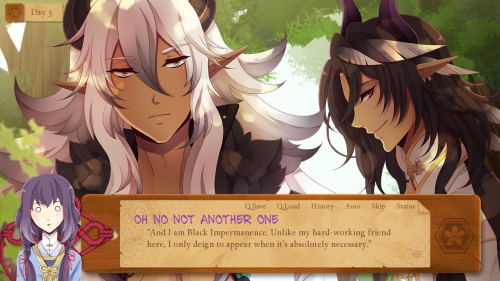Trending
Opinion: How will Project 2025 impact game developers?
The Heritage Foundation's manifesto for the possible next administration could do great harm to many, including large portions of the game development community.
There was a new addition to the Indie Megabooth at PAX East this year: the Visual Novel Reading Room. It provided an opportunity to sample several promising new VNs.

It’s no secret that I love visual novels. It's partly due to the vagueness of the term which, perhaps not surprisingly, works similarly to how “anime” describes a medium more than a genre. Visual novels take all kinds of forms, after all. Even if many of them share the same RenPy interface, little else links them; many have an anime aesthetic but not all; many have a relatively low difficulty level, but certainly not all (play Long Live the Queen for a taste of what I call a “bullet hell VN”). That diversity deserves a unified showcase where they can be compared side-by-side.
Love Conquers All Games’ Christine Love agreed and spearheaded the creation of a new addition to the Indie Megabooth at PAX East this year: the Visual Novel Reading Room. It featured her own game, Ladykiller in a Bind, which was already a novel take on the medium with its approach to dialogue and sexuality, and last year’s successful We Know the Devil by Date Nighto. But while these served as familiar anchors of visual novel-dom, there were new up and coming releases available for play as well, one of which really demonstrates the flexibility of the medium.
Dev or Die’s Date or Die, Accidental Queens’ A Normal Lost Phone, and Lettuce Waltz’s Spirit Parade are a tour through the medium’s potential and how it can be so thoroughly realized through inclusive design that tells strange new stories.

If there is a through-line that links visual novels it’s romance. Most VNs have branching paths through the game’s narrative called “routes” which are invariably named after the object of your character’s affections. Experiencing them all is how VN completionists satisfy themselves. VNs often as not succeed when they say or do something new with the idea, however.
Ladykiller, for instance, was an instant classic for its groundbreaking portrayal of BDSM as both achingly sexy and deeply human--and its take on relationships was starkly mature, delving into the nature of love, “fucked up fantasies,” and abusive dynamics. VNs endure when their romance is either unique (Ladykiller) or not what the game hinges on for its distinction (e.g. Black Closet).
***
A Normal Lost Phone eschews the route system entirely, however, instead providing a microscopic examination of relationships under the stress of a double life. Available for both computer and mobile platforms, the game is best enjoyed on your phone as its entire interface is that of a lost mobile phone you rifle through in an attempt to discover who it belongs to.

A Normal Lost Phone
Like so many excellent mobile games, Lost Phone works optimally when the device you play it on feels like an artifact of the game world itself. It presents you with a standard stylized smart phone interface with different applications you have to access in order to uncover the truth about Sam, the enigmatic owner of the phone. Sam has gone missing, apparently, and his phone holds clues as to why. Unlocking new apps requires one to solve puzzles, such as assembling different clues to get a wifi password that’ll allow you to log on to Sam’s dating profile.
There’s much that could be said about privacy and personal space here, but for now it’s enough to say that like so many games that diegetically simulate this kind of keyhole-peeping, it’s very engrossing. Our appetite for the inner lives of others is something Lost Phone unapologetically plays with, making of Sam’s phone a digital Greenbriar house that demands exploring. For the moment, who you are, and what the ethics are of you invading Sam’s life like this are for you the player to decide on.
***
Speaking of ethics, or a woeful lack thereof, Date or Die sees you take on the role of a nameless character dragooned into an evil reality TV show. You are “matched” with one of six other contestants by a beguiling villain who calls himself The Host. The last two people left alive after a series of challenges will--the Host promises--live happily ever after. After all, he wants to prove that some people are truly devoted to finding their one true love: devoted enough to kill. It’s delightfully twisted and seems set to be a delectable bit of horror. I could only access the intro, but Arden Ripley’s dark creativity still entices.

Once again, the game offers a sideways take on relationships, using the insight of the medium to tell a new story that goes beyond a simple anime fantasy while still hitting those buttons. As is often the case with early previews like this, much remains to be seen. But the prologue available at PAX East gave a good enough sense of the characters that I feel a cautious optimism about what’s to come later in the year when Date or Die releases. They all feel distinctive, like each could make a uniquely intoxicating brew when mixed with your character. Evidently, even the Host is romanceable, though this is explicitly written as an unhealthy relationship where ugly dynamics are fully explored.
After all, Ripley promises us a game about “the horrors of love.”
It takes me back to Hanako Games’ Magical Diary, the inaptly named tale of a young woman at a Hogwarts-style magic school, learning spells and drowning in teen drama. The story has routes that involve romancing a teacher or romancing a murderously abusive young man; neither is played up as a straight morality tale but each explores the unsettlingly ugly nature of each relationship without glamorizing or ironing over everything wrong with each situation.
This is all to the good, so far as I’m concerned; we need to be able to indulge in forbidden stories. Christine Love did this well in Ladykiller as well; not every expression of romance is safe or “unproblematic,” but then neither is love and sex in the real world. The best visual novels explore that territory without apology, instead of regurgitating the same masturbatory fantasies. The latter can be fun in their own right, but they do nothing to advance the medium.
***
The display at PAX East was charming, taking up only two booths worth of space, with economically arranged tables and screens to display every title (Lost Phone’s mobile capability was a huge boon here), while Ladykiller was discreetly tucked behind its usual elegant screen to protect the modesty of PAXgoers.
Nearer to the crowd was the large TV displaying Spirit Parade, which was perhaps the most traditional visual novel on offer in the Reading Room. I didn’t get anywhere near as much time with this one as I wanted, but it still catches one’s attention with its premise. A polio-stricken 17 year old girl is suddenly transported to a spirit world populated by demons celebrating a weeks-long festival. You have to help her find her way home.

Spirit Parade
The protagonist, Nara, is described as “cynical” and deeply suspicious of the intentions of others after years of being patronized and pitied for her disability. Her time in the Spirit World is meant to be a reckoning on how she approaches life: “Will [Nara] be able to get over her bitterness borne from the past, or will she be engulfed in hatred and lose sight of what's truly important?” asks the game’s ad copy. It’s an interesting hook, but I could see this going badly very quickly given longstanding stereotypes of people with disabilities as embittered complainers who are in dire need of inspiration.
There is certainly a lot of merit to the reasons for Nara’s bitterness and mistrust, however. The empathy required to write that in a way that centers her rather than the able bodied people in her life leaves me cautiously optimistic. A lot depends on how the narrative shakes out, and how the promised “good” and “bad” endings are framed.
Spirit Parade also grabs your attention with its striking artwork, and there’s the novelty of voice acting to boot. Whatever else it may be, it is a beautiful VN whose presentation, like a traditionally staged opera, cleaves proudly to the fundaments of its medium. It may be the least avant-garde or daring of all the Reading Room offerings but it seems to do what it does quite well and has a lot to offer anyone who enjoys VNs.
***
 “Spirit parade” is a pretty apt way of describing the PAX show floor, with an endless river of colorful costumes, personalities, and lost souls alike flowing past the wild, almost magical booths. To say there’s always something to catch your eye is an understatement. But every time someone asked me that standard icebreaker question at the convention, “what stood out to you the most on the show floor?” I found myself always mentioning the VR Reading Room.
“Spirit parade” is a pretty apt way of describing the PAX show floor, with an endless river of colorful costumes, personalities, and lost souls alike flowing past the wild, almost magical booths. To say there’s always something to catch your eye is an understatement. But every time someone asked me that standard icebreaker question at the convention, “what stood out to you the most on the show floor?” I found myself always mentioning the VR Reading Room.
It’s quite possible that I might not have noticed it so quickly if Christine Love, whose work I’ve long been well disposed to, hadn’t put her name behind it and taken the initiative to create it. But I’ve always loved visual novels, which gleefully traipse into territory most other videogames are quite shy about. They’ve been vehicles for porn, romance, narrative-emphasis, casual gaming, and female protagonists for years now. But they have also pushed boundaries in portrayals of queerness and trans life--and as I played through all of the Reading Room’s offerings I realized that this was what linked these very different games together like a necklace.
Though no literature or marketing for the Reading Room advertised the fact, all had “queer content,” all had gay and/or trans characters. There weren’t many multi-game booths or pavilions that could make that claim (although Ysbryd has been doing a commendable job with this lately on show floors). It was a lovely thing to see amid PAX’s maelstrom.
Most comforting of all is the thought that perhaps some souls who wandered into one of the Reading Room’s weird, adorable wonderlands might find themselves just a bit less lost.
Katherine Cross is a Ph.D student in sociology who researches anti-social behavior online, and a gaming critic whose work has appeared in numerous publications.
You May Also Like